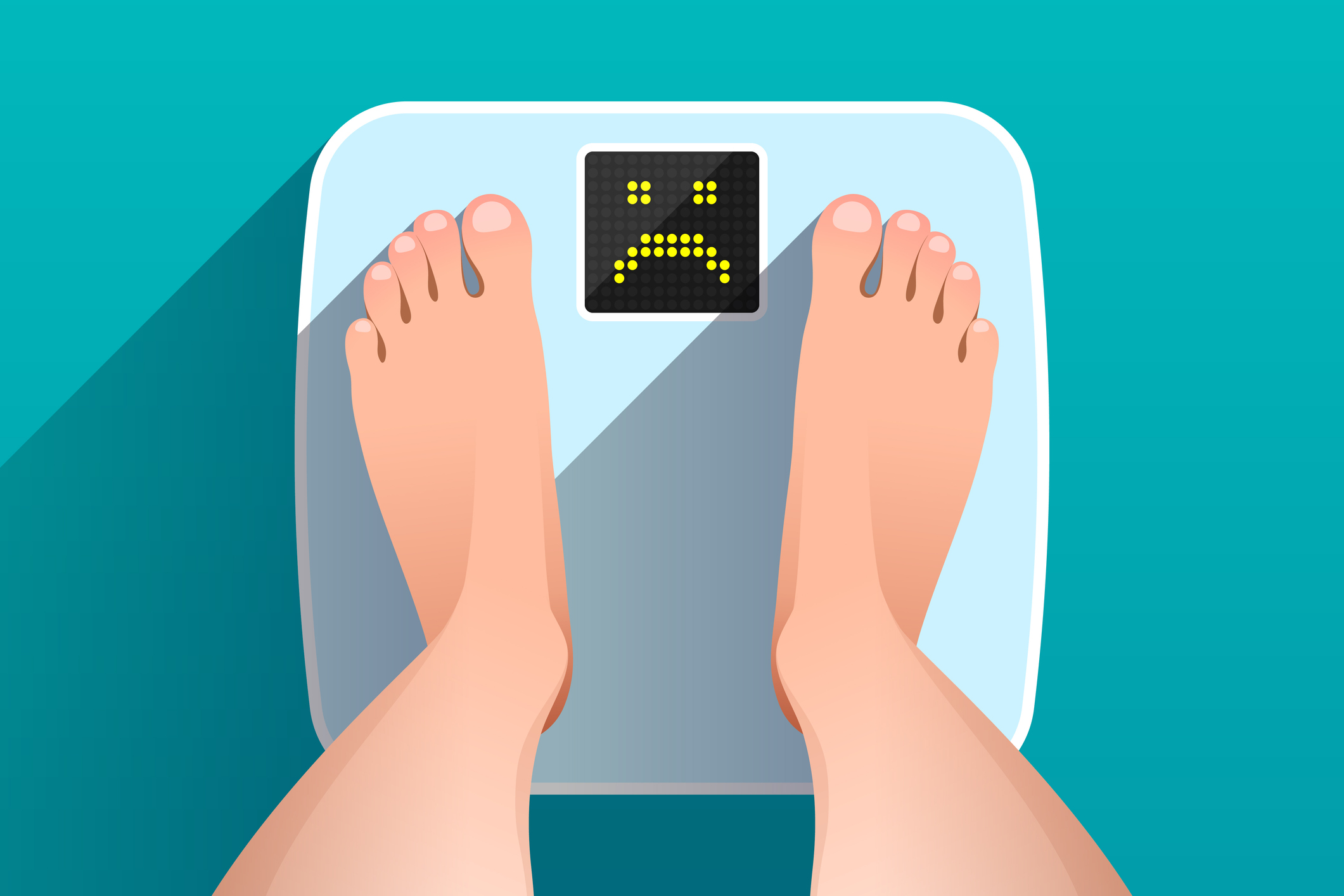Can A Smart Bathroom Scale Make You Any Healthier?
Some argue that app connectivity makes a pound counter more helpful, but others say it merely gussies up an outmoded barometer of health.
USING A BATHROOM SCALE once meant nervously watching a literal needle wiggle around until it settled on a number, whether dismaying or encouraging. In 2022, such scales have gone the way of the slide projector and Rolodex, replaced by newer digital versions that employ more-advanced technology. But in an era when nearly every device is smart whether we like it or not, even these might be headed for obsolescence.
Some doctors and personal trainers argue that it’s high time we all embraced smart bathroom scales that do much more than display your weight. Step on one and it sends a mild electrical current through your body to gather data. Because fat and water resist electricity differently, the scale can use a process called Bioelectric Impedance Analysis to measure how much of each your body has. It then sends this data to an app on your phone, uses software to estimate other metrics and keeps track of how each changes in your body over time.
It’s a pretty neat trick, but not all healthcare professionals are convinced this data is a useful way to measure one’s overall health. (And some experts would rather you ditch all bathroom scales entirely.) So is a smart scale a smart move? Here, we present both sides of the issue.
Yes, a smart scale can help you keep tabs on important health statistics.
If you want to lose or gain weight, maintain your current weight, add muscle or decrease body fat, proponents say a smart scale can help you measure and analyze your progress toward these goals much better than scales that can’t track data.
Their argument is simple: You can’t change what you do not understand. “Self-monitoring is a key strategy for making any behavior change or setting a personal goal,” said Dr. Robert F. Kushner, a weight management expert and professor at Northwestern University’s Feinberg School of Medicine. And while both smart and unconnected scales let you measure weight, only a smart scale automatically helps you track how that weight fluctuates, revealing how your body responds to any lifestyle changes you are making. Theoretically, you could track this yourself with pen and paper. But who has the time?
Jake Sarnowski, a 40-year-old product manager, was already struggling to balance an exercise routine with the demands of family life. Then, with his wife and two children, he moved to Woodbury, Minn., a place distinguished, as he put it, by “a lot of deep-fried cheese curds.” He hadn’t owned a scale for years, but when he spotted a smart scale from Wyze on sale last October, he bought it. He said he values the way it lets him keep tabs on his weight. “It’s my product-manager instinct kicking in. Whatever is measured is improved,” he said.
You can usually get the extra features of a smart scale without paying extra—many cost about the same (or even less) than “dumb” digital alternatives. The Wyze Scale X, a new release from the company that also makes smart home security devices, can measure 13 body composition metrics. You can find other models, like the Etekcity ESF24 Smart Fitness Scale that measures the same metrics, or more opulent options, like the In body H20N, which includes a handlebar that allows it to more accurately measure data from the top half of your body, instead of relying on estimates. Fans say any of these could help you meet your fitness goals, provided you don’t mind immediately checking your phone after stepping on the scale.
No, a smart scale encourages you to fixate on the wrong kind of health data.
Not everyone feels people need the extra information a smart scale provides. Maryelizabeth Carter, owner of Underground Trainers, a boutique personal fitness service in Rutherford, N.J., said most folks just don’t need real-time access to information as granular as their bone mass and their metabolic age. These measures can be hard to understand, especially without active guidance from a medical professional. And Ms. Carter said getting too caught up in the numbers can actually lead to unhealthy behaviours. “You can lose track of your overall objectives. Being in good physical shape is dependent on healthy eating and living, not just the information provided by a scale,” she said. An old-fashioned scale, by comparison, only provides data that you might actually know how to use.
Some experts go further and question whether weighing yourself at all is a good idea. Hannah Coakley, a registered dietitian and nutrition therapist in Brooklyn who specializes in eating disorder treatment and recovery, said scales—smart or not—can do more harm than good. “Study after study shows that when we take a weight-first approach to health, it simply doesn’t work,” said Mx. Coakley, who uses the gender-neutral honorific. “Leading with weight can be ultimately damaging or stigmatizing. There are other ways to look at health.” If you want to spend money on something that will improve your health, they recommend a subscription to a meditation app or a gym membership (“not to burn calories but to move your body”). And for an option that won’t cost anything, “get outside and do what makes you feel good.”
Anna Millhiser, a 36-year-old vice president of client success and hospital partnerships who lives in Baltimore, wasn’t too worried about how tracking weight could impact her health when she bought a Garmin smart scale about five years ago. But once its batteries ran out, she felt no need to replace them. “I realized weighing myself wasn’t high on my priority list, so I just stopped and life went on,” she said. “It’s been dead for probably two years.”
Reprinted by permission of The Wall Street Journal, Copyright 2021 Dow Jones & Company. Inc. All Rights Reserved Worldwide. Original date of publication: June 13, 2022
 Copyright 2020, Dow Jones & Company, Inc. All Rights Reserved Worldwide. LEARN MORE
Copyright 2020, Dow Jones & Company, Inc. All Rights Reserved Worldwide. LEARN MORE
This stylish family home combines a classic palette and finishes with a flexible floorplan
Just 55 minutes from Sydney, make this your creative getaway located in the majestic Hawkesbury region.
As Paris makes its final preparations for the Olympic games, its residents are busy with their own—packing their suitcases, confirming their reservations, and getting out of town.
Worried about the hordes of crowds and overall chaos the Olympics could bring, Parisians are fleeing the city in droves and inundating resort cities around the country. Hotels and holiday rentals in some of France’s most popular vacation destinations—from the French Riviera in the south to the beaches of Normandy in the north—say they are expecting massive crowds this year in advance of the Olympics. The games will run from July 26-Aug. 1.
“It’s already a major holiday season for us, and beyond that, we have the Olympics,” says Stéphane Personeni, general manager of the Lily of the Valley hotel in Saint Tropez. “People began booking early this year.”
Personeni’s hotel typically has no issues filling its rooms each summer—by May of each year, the luxury hotel typically finds itself completely booked out for the months of July and August. But this year, the 53-room hotel began filling up for summer reservations in February.
“We told our regular guests that everything—hotels, apartments, villas—are going to be hard to find this summer,” Personeni says. His neighbours around Saint Tropez say they’re similarly booked up.
As of March, the online marketplace Gens de Confiance (“Trusted People”), saw a 50% increase in reservations from Parisians seeking vacation rentals outside the capital during the Olympics.
Already, August is a popular vacation time for the French. With a minimum of five weeks of vacation mandated by law, many decide to take the entire month off, renting out villas in beachside destinations for longer periods.
But beyond the typical August travel, the Olympics are having a real impact, says Bertille Marchal, a spokesperson for Gens de Confiance.
“We’ve seen nearly three times more reservations for the dates of the Olympics than the following two weeks,” Marchal says. “The increase is definitely linked to the Olympic Games.”

Getty Images
According to the site, the most sought-out vacation destinations are Morbihan and Loire-Atlantique, a seaside region in the northwest; le Var, a coastal area within the southeast of France along the Côte d’Azur; and the island of Corsica in the Mediterranean.
Meanwhile, the Olympics haven’t necessarily been a boon to foreign tourism in the country. Many tourists who might have otherwise come to France are avoiding it this year in favour of other European capitals. In Paris, demand for stays at high-end hotels has collapsed, with bookings down 50% in July compared to last year, according to UMIH Prestige, which represents hotels charging at least €800 ($865) a night for rooms.
Earlier this year, high-end restaurants and concierges said the Olympics might even be an opportunity to score a hard-get-seat at the city’s fine dining.
In the Occitanie region in southwest France, the overall number of reservations this summer hasn’t changed much from last year, says Vincent Gare, president of the regional tourism committee there.
“But looking further at the numbers, we do see an increase in the clientele coming from the Paris region,” Gare told Le Figaro, noting that the increase in reservations has fallen directly on the dates of the Olympic games.
Michel Barré, a retiree living in Paris’s Le Marais neighbourhood, is one of those opting for the beach rather than the opening ceremony. In January, he booked a stay in Normandy for two weeks.
“Even though it’s a major European capital, Paris is still a small city—it’s a massive effort to host all of these events,” Barré says. “The Olympics are going to be a mess.”
More than anything, he just wants some calm after an event-filled summer in Paris, which just before the Olympics experienced the drama of a snap election called by Macron.
“It’s been a hectic summer here,” he says.

AFP via Getty Images
Parisians—Barré included—feel that the city, by over-catering to its tourists, is driving out many residents.
Parts of the Seine—usually one of the most popular summertime hangout spots —have been closed off for weeks as the city installs bleachers and Olympics signage. In certain neighbourhoods, residents will need to scan a QR code with police to access their own apartments. And from the Olympics to Sept. 8, Paris is nearly doubling the price of transit tickets from €2.15 to €4 per ride.
The city’s clear willingness to capitalise on its tourists has motivated some residents to do the same. In March, the number of active Airbnb listings in Paris reached an all-time high as hosts rushed to list their apartments. Listings grew 40% from the same time last year, according to the company.
With their regular clients taking off, Parisian restaurants and merchants are complaining that business is down.
“Are there any Parisians left in Paris?” Alaine Fontaine, president of the restaurant industry association, told the radio station Franceinfo on Sunday. “For the last three weeks, there haven’t been any here.”
Still, for all the talk of those leaving, there are plenty who have decided to stick around.
Jay Swanson, an American expat and YouTuber, can’t imagine leaving during the Olympics—he secured his tickets to see ping pong and volleyball last year. He’s also less concerned about the crowds and road closures than others, having just put together a series of videos explaining how to navigate Paris during the games.
“It’s been 100 years since the Games came to Paris; when else will we get a chance to host the world like this?” Swanson says. “So many Parisians are leaving and tourism is down, so not only will it be quiet but the only people left will be here for a party.”
This stylish family home combines a classic palette and finishes with a flexible floorplan
Just 55 minutes from Sydney, make this your creative getaway located in the majestic Hawkesbury region.






















